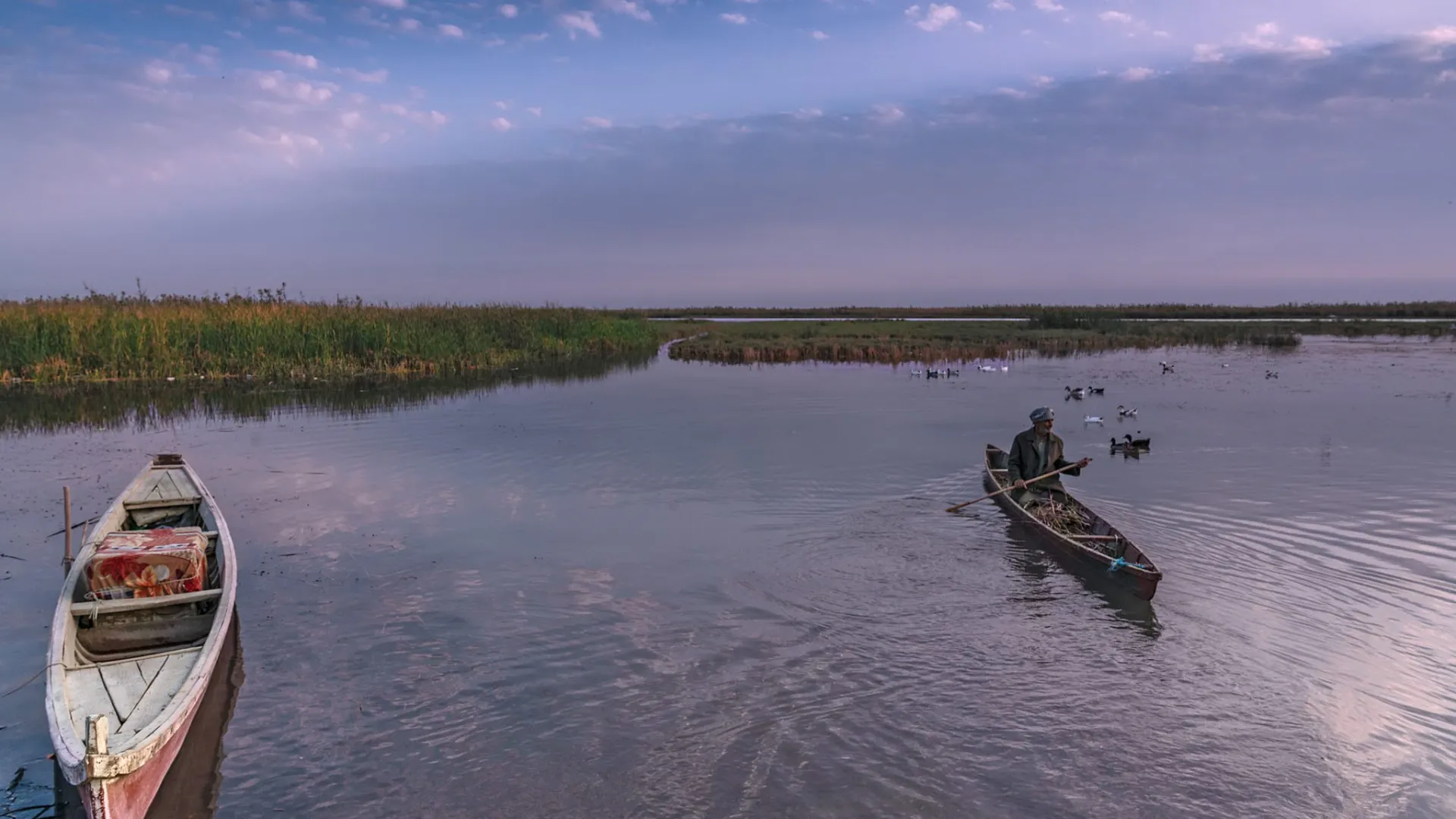Abu Abbas possessed an unparalleled understanding of the Iraqi Marshes, having inhabited them throughout his lifetime. When Saddam Hussein’s regime drained the wetlands in the early 1990s, Abu Abbas bore witness to the ensuing devastation.
A decade later, as young men dismantled the barriers that had kept water out following Hussein’s downfall, he was among those who watched the marshes reclaim their aqueous expanse.
However, the journey hasn’t been smooth sailing. The marshes now grapple with the challenges of climate change and mismanagement. Despite this, Abu Abbas remains steadfast in his optimism.
In the waning days of his health, Abu Abbas received a visit from his nephew, Jassim Al-Asadi. Inquiring about the marshes’ condition, Abu Abbas was met with a grim assessment from Jassim. Unperturbed, Abu Abbas reassured him, emphasizing that the marshes would endure, even if the water turned saline, as long as there were defenders like Jassim.
Once sprawling over 10,500 square kilometers in 1973—equivalent to the size of Lebanon—the marshes were a haven for diverse flora, fauna, and a thriving human population estimated at 500,000 by the mid-20th century. Adjacent to these wetlands lay historic cities like Ur, believed to be the birthplace of Abraham, and Uruk, the world’s largest city in 3200 BCE.
Although primarily situated in Iraq, a smaller portion known as Hawr al-Azim extends into Iran. Abu Abbas bore witness to the marshes’ natural ebb and flow, influenced by floods, droughts, and the traditional livelihoods reliant on fishing, hunting, reed production, and agriculture. Concurrently, he observed the escalating human impact, including warfare, dam construction upstream, oil extraction, and agricultural pollution.
Jassim’s upbringing mirrored his uncle’s, immersed in the marshes and the nearby town of Chibayish. After relocating to Baghdad for university, he joined the Iraqi Communist Party, leading to his imprisonment and torture by Hussein’s regime. Following his release, he served an extended military term during the Iran-Iraq War before returning to Chibayish as a government engineer.
However, the tranquility of marsh life shattered in the early 1990s when government actions led to their desiccation. Forced to relocate to Babylon, Jassim discovered the government’s deliberate efforts to reclaim land, displace residents, and eradicate their culture.
Collaborating on “The Ghosts of Iraq’s Marshes,” Jassim and his co-author recount his trials, shedding light on the marshes’ creation and destruction. Hussein’s motives ranged from modernization to suppressing ties to Iran and quelling dissent following the Gulf War.
Despite warnings from the UN, it took the US invasion in 2003 to reveal the full extent of the marshes’ devastation, now recognized as a monumental environmental and humanitarian tragedy.
Vital for Iraq:
Iraq is currently grappling with a severe freshwater shortage, with 90% of its rivers contaminated and millions facing dwindling access to water. As the fifth most susceptible nation to climate change, the situation is dire.
Freshwater is crucial for both human consumption and agriculture, and in Iraq, wetlands play a pivotal role in addressing these needs. Despite their high evaporation rates, wetlands serve as vital water storage systems and efficient wastewater treatment facilities. Jassim’s endeavors have highlighted their ability to absorb and purify waste, showcasing their value.
Wetlands also foster biodiversity, serving as essential habitats for migratory birds and sustaining significant fish populations. Historically, they supplied over 60% of the country’s fish consumption. Moreover, they contribute to local climate moderation, with dried marshes exacerbating temperature rises and water scarcity leading to dust storms.
Beyond their ecological significance, the Iraqi Marshes hold immense historical and cultural value, embodying Iraq’s rich heritage and promising future. Despite their importance, marsh preservation ranks low on the country’s policy agenda.
Jassim’s advocacy for the marshes often pits him against influential agricultural and oil interests, as well as governmental bodies like the Ministry of Water Resources. The transformation of former wetlands into lucrative oilfields further threatens their existence, with oil companies resisting measures to mitigate pollution and preserve remaining marshland.
Oil, which fuels Iraq’s economy, takes precedence over other concerns, overshadowing the marshes’ plight. Additionally, agricultural stakeholders argue for redirecting water resources towards crop cultivation.
Jassim’s international engagements and connections have invited suspicion, with baseless accusations of espionage tarnishing his reputation. Despite facing grave threats, including abduction and torture, Jassim remains committed to his homeland and its marshes, seeking refuge in safer locales but refusing to abandon Iraq.
For Jassim, the marshes are intrinsic to his identity and purpose, echoing his uncle’s belief that their survival hinges on defenders like him.










